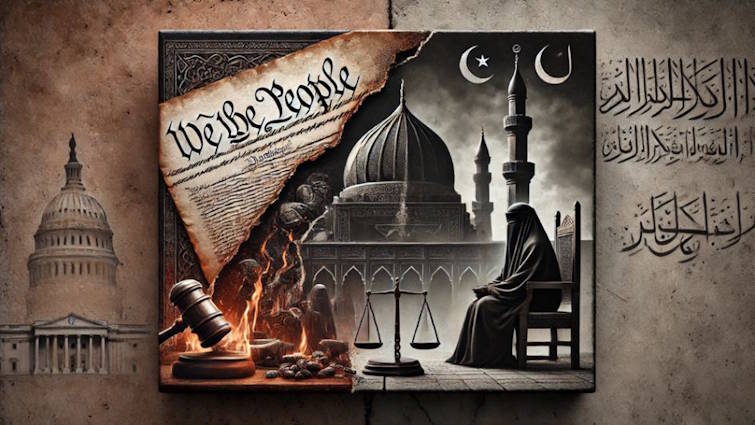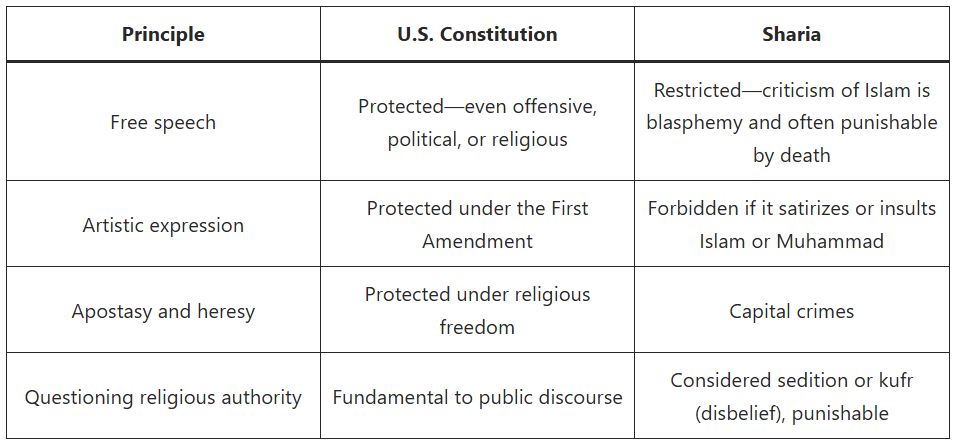
The Constitution vs. Sharia: One Must Fall
Why American freedom can’t coexist with Islamic supremacy
Introduction: Two Legal Systems, One Nation
America was built on a revolutionary premise: that law does not descend from the heavens by clerical decree, but rises from the consent of the governed. That sovereignty lies with the people — not prophets, not priests, and not political imams.
This radical departure from millennia of theocratic rule gave birth to something rare in human history: a nation where the individual was sovereign, where speech could offend kings and survive, where worship was free — or refused — without the sword.
Sharia rejects all of it.
While the Constitution begins with “We the People,” Sharia begins with “Allah has said.” It is not a suggestion. It is not a set of personal morals. It is a divine legal code — total, mandatory, and eternal. Sharia governs not just prayer and charity, but contracts, punishments, war, finance, sex, dress, and even restroom etiquette. It claims authority over every soul, in every place, in every era.
And it demands supremacy over all man-made law.
This is not a theological debate over doctrine. This is a collision between two incompatible legal civilizations. One born of liberty, the other forged in submission. One where law is written, debated, and repealed — the other where law is revealed and enforced without question.
This is not about Muslims praying in peace. It’s about whether Islamic law — where speech is censored, women are silenced, apostates are hunted, and non-Muslims are second-class — can ever be squared with a constitutional republic.
It cannot.

Because one system believes rights are inherent. The other believes they are granted — and revoked — by Allah’s law.
And so we are faced with a choice.
Not between tolerance and intolerance.
But between freedom and theocracy.
Between law by consent — and law by conquest.
One must fall.
1. The Architecture of Sharia
Sharia — often softened in Western media as mere “religious guidance” — is, in fact, a comprehensive legal system claiming divine authority. The word itself means “the path,” but not a path you choose. It’s the mandated road laid by Allah for how every Muslim — and ultimately every society — must live.
It governs not just prayer and fasting but criminal law, taxation, warfare, finance, family structure, contracts, sexual conduct, and governance. It does not offer suggestions. It issues commands. Sharia is, by its own definition, total and eternal. It cannot be reformed because it was never designed to change. Reform implies fallibility. In Sharia, divine law is perfect, final, and immutable.
Its legal foundation draws from four sources:
- The Quran – Considered by Muslims to be the literal, immutable word of Allah. It contains legal rulings on everything from theft (Quran 5:38, “Cut off the hands of thieves”) to adultery (Quran 24:2, “Flog them with a hundred stripes”), to warfare against nonbelievers (Quran 9:29, “Fight those who do not believe… until they pay the jizya”).
- The Hadith – These are the recorded sayings and actions of Muhammad. They form the largest portion of Islamic legal precedent. In Sahih Muslim 1690b, Muhammad orders the stoning of adulterers. In Bukhari 9:84:57, he declares, “Whoever changes his religion, kill him.”
- Ijma (consensus) – If the early jurists agreed on a ruling, it is locked into law forever. No legislature. No debate. No sunset clause.
- Qiyas (analogy) – Legal reasoning by analogy. For example, since wine is forbidden due to intoxication, heroin is also forbidden. Not by democratic vote — by precedent.
These rulings are not abstract. They are codified into books still used in Islamic courts around the world. The most prominent is Reliance of the Traveller (Umdat al-Salik), a classical 14th-century legal manual endorsed by Al-Azhar University, the highest authority in Sunni Islam. It details everything from the correct way to wash before prayer, to when it’s lawful to enslave non-Muslims, to how to execute apostates and adulterers.
In one passage, it plainly states:
“A free Muslim man may marry up to four women… A man may hit his wife… Apostates are to be killed without question… The testimony of a woman is worth half that of a man.”
(Reliance of the Traveller, Sections m6.10, m10.12, o8.1, o24.7)
Still think this is a matter of private faith?
Look around the world today.
- Iran: Girls are beaten or imprisoned for refusing the hijab — enforced under Article 638 of the Islamic Penal Code, which criminalizes “violations of public modesty” according to Sharia norms.
- Pakistan: A 13-year-old Christian girl can be kidnapped, raped, and forcibly converted with impunity. The perpetrators often hide behind Pakistan’s blasphemy laws (Penal Code Sections 295–298), which allow accusations with no burden of proof and carry death penalties. Over 1,800 people have been charged in the last decade — many lynched before trial.
- Afghanistan: After the Taliban’s return, women were erased from public life almost overnight. Under Taliban-issued Sharia decrees, girls are barred from secondary school, women cannot travel without male guardians, and female TV anchors are forced to veil. These policies are enforced through the Ministry for the Propagation of Virtue and the Prevention of Vice, a direct institutional arm of Islamic law.
These are not medieval holdovers. These are modern, functioning legal systems — implemented in the name of divine law.
This is not Islam as a spiritual path.
This is Islam as a legal regime.
And it does not coexist. It conquers.
2. Speech vs. Blasphemy: Who Gets to Speak?
In America, speech is a birthright. Under Sharia, it is a privilege — one contingent on submission.
Let’s begin with a side-by-side comparison:

The U.S. Constitution begins with a presumption of liberty. It protects even the most offensive speech: political dissent, satire, religious criticism. A pastor may denounce Islam. An artist may paint the Prophet. A Muslim may leave Islam entirely and speak openly about it.
Under Sharia, each of these is a punishable crime.
“Whoever curses the Prophet… is to be killed.”
— Reliance of the Traveller, o8.7
“Whoever turns from Islam, kill him.”
— Sahih Bukhari 9:84:57
This isn’t just theory. These laws have teeth — and blood.
Real-World Consequences of Sharia’s Speech Laws
- France (2015): Islamist gunmen stormed the offices of Charlie Hebdo in Paris, murdering 12 people over satirical cartoons of Muhammad. The shooters invoked Sharia blasphemy law as justification.
- Pakistan: Asia Bibi, a Christian mother, spent nearly a decade on death row after being accused of insulting Muhammad in a conversation about drinking water. Though eventually acquitted, she had to flee the country under threat of mob execution.
- Iran: British author Salman Rushdie was stabbed in 2022, decades after Ayatollah Khomeini issued a fatwa calling for his assassination over The Satanic Verses. The attacker cited Rushdie’s “blasphemy” as motivation — a concept rooted in Sharia jurisprudence.
- USA (Texas): In 2015, two jihadists attacked a free speech event in Garland, Texas, where artists were drawing Muhammad. They were killed by police, but the message was clear: Sharia’s speech codes are global.
In each of these cases, the intent was not to argue — it was to silence. Not to defend Islam — but to enforce submission.
Under Sharia, speech is not a right to be exercised. It is a tool to preserve religious orthodoxy and suppress dissent.
Blasphemy as a Weapon
In many Muslim-majority nations, blasphemy laws are not fringe statutes — they are central tools of state control, rooted in Sharia and designed to protect Islamic supremacy, not public order. These laws are so vague and subjective that mere accusations can destroy lives — often without due process.
Pakistan
- Penal Code Sections 295–298 criminalize insults against Islam, the Quran, and Muhammad.
- Offenses under Section 295-C (blasphemy against Muhammad) are punishable by mandatory death.
- No proof is required beyond accusation; trials are often mob-influenced.
- From 1987 to 2021, over 1,800 people were charged. At least 80 people have been murdered without trial.
Iran
- Blasphemy is prosecuted under the charge of “sabb al-nabi” (insulting the Prophet) and “moharebeh” (waging war against God).
- Punishable by death under Iran’s Islamic Penal Code, Articles 513 and 262–264.
- Converts to Christianity, critics of clerical rule, and dissidents are routinely jailed, tortured, or executed.
Saudi Arabia
- Under Article 1 of the Basic Law, the Quran and Sunnah are the constitution — Sharia is the legal foundation.
- Blasphemy falls under hudud (fixed crimes against God) and is punishable by beheading or long-term imprisonment.
- Vague charges like “spreading corruption on earth” are used to suppress speech.
Afghanistan (Taliban)
- The Taliban have reinstated strict Sharia since 2021, and blasphemy is punished by public execution or hanging.
- There is no formal penal code; instead, courts operate under the authority of Islamic judges enforcing fiqh (jurisprudence).
- Accusations require no due process; fear alone enforces silence.
Mauritania
- Article 306 of the Penal Code mandates the death penalty for Muslims who “speak lightly of the Prophet.”
- In 2014, blogger Mohamed Cheikh Ould Mkhaitir was sentenced to death for a Facebook post. He spent years in solitary confinement.
Indonesia
- The world’s most populous Muslim country enforces blasphemy under Article 156(a) of the Criminal Code.
- In 2017, Jakarta’s Christian governor, Basuki Tjahaja Purnama (Ahok), was jailed for two years after quoting the Quran in a political speech.
- Hundreds have been arrested or attacked under this law.
Egypt
- Article 98(f) of the Penal Code punishes “contempt of religion” with up to five years in prison.
- Coptic Christians, atheists, and reformist Muslims are frequent targets.
- Courts interpret “insult” broadly — including social media posts or satire.
Bangladesh
- No explicit blasphemy law, but Section 295A (a British colonial holdover) criminalizes “deliberate and malicious acts intended to outrage religious feelings.”
- Radical groups routinely issue death threats or fatwas, and the state often prosecutes the victims instead of the mobs.
These laws are not designed to protect faith. They are designed to silence dissent. They are not applied equally — only Islam is defended.
The consequences are not theoretical:
- False accusations are common.
- Mob violence replaces courts.
- Minorities live in fear.
- Speech dies.
This is not justice.
It is the enforcement of religious tyranny — cloaked in law.
Even Muslims are not safe. Reformists, secularists, and feminists are regularly targeted under the same laws. In Sharia’s logic, freedom of speech is rebellion — and rebellion must be crushed.
This is not just about protecting feelings. It’s about power.
Because when the state decides what cannot be said, it decides what cannot be thought.
And when Sharia governs speech, it does so not to protect truth — but to extinguish it.
3. Women in the U.S. vs. Subjugation by Design of Sharia
Click here to read the full article
Published with permission of libertysentinel.org